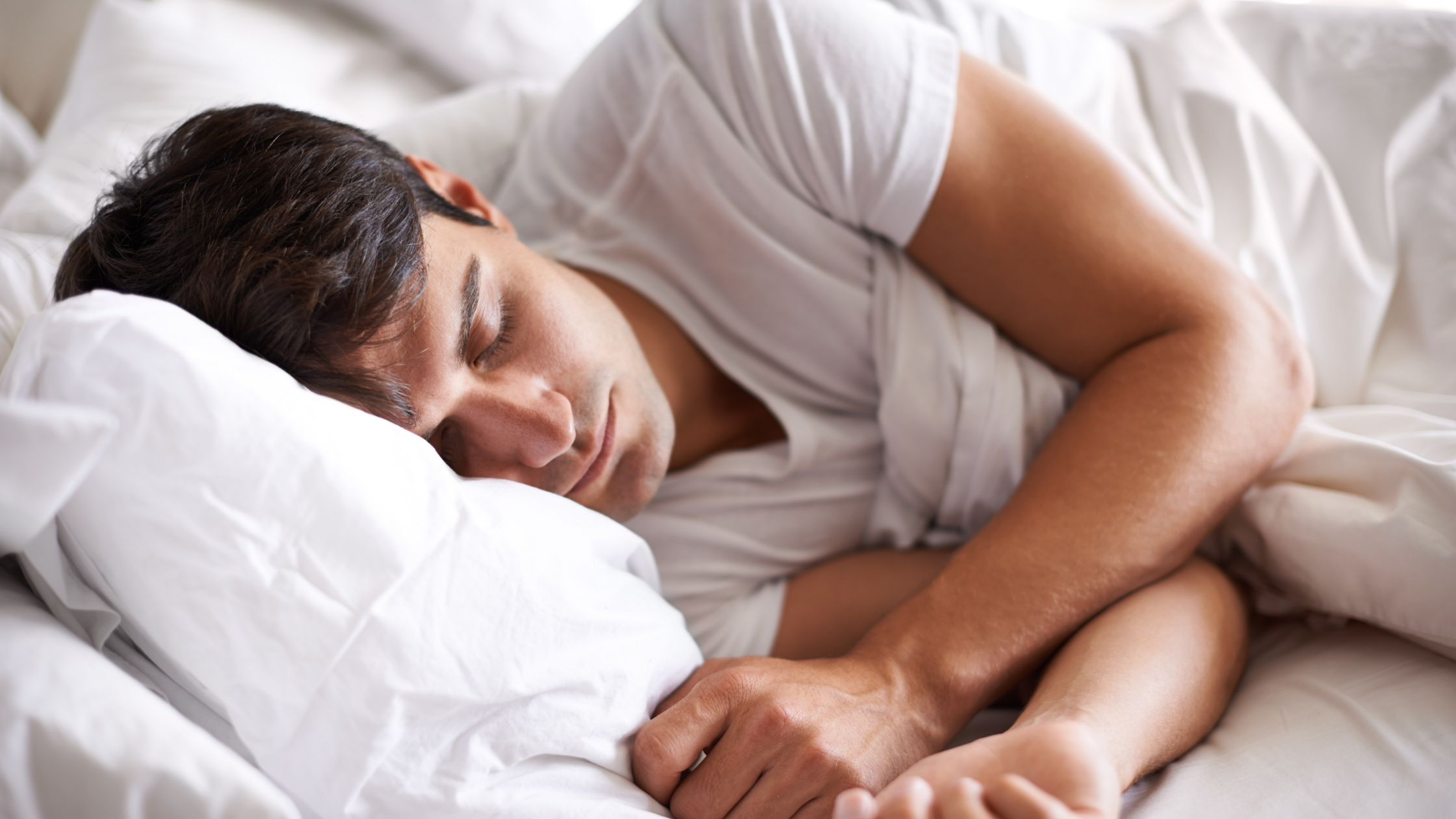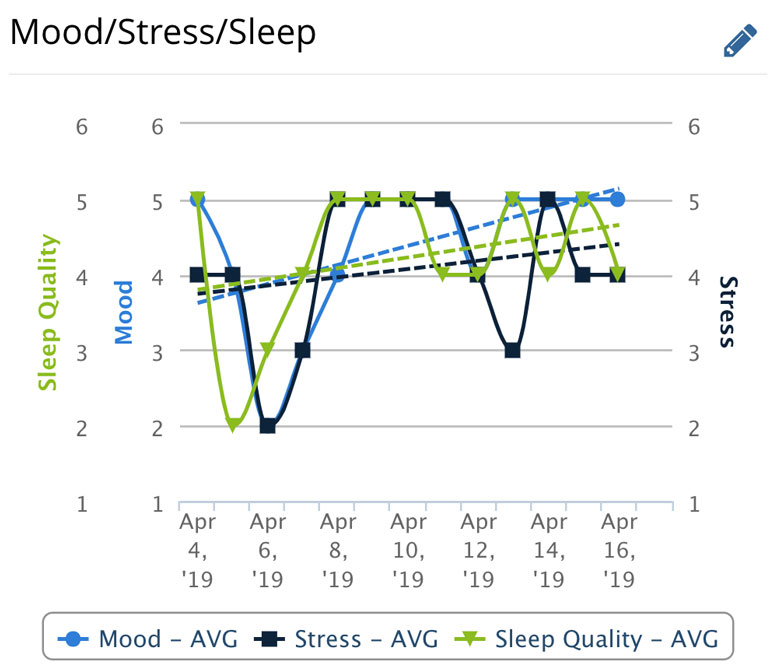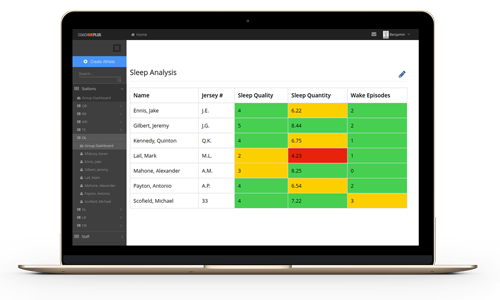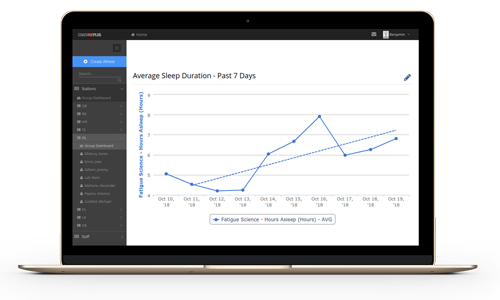

The Importance of Sleep with Athletes
Sleep is vital to restoring human biological function, and athletes competing in sport can either utilize the natural process as recovery or fall victim to common impairments. Athletes who are sleeping better tend, on average, to have higher levels of performance on and off the field, and better mental health. With the increase in concussion awareness, sleep is one of those therapeutic interventions that is often impacted by dysfunction from traumatic brain injury. Therefore, sleep should be seen as both a treatment and a functional health measurement for athletes. The competitive advantage and ethical responsibility of measuring sleep should be considered by coaches and sport support professionals.
The physiological consequences of sleep deficiency can be seen throughout the entire body, and it is a major contributor to disease and poor health, including the risk of specific cancers. Sleep deficiency can result in:
1. Decreased motor performance and reaction time
2. Decreased decision-making and communication abilities
3. Overall decrease in cognitive performance
4. Increased sluggishness and drowsiness, and a sense of low energy
5. Increased feeling of anxiety and depression
6. Increased risk of metabolic disorders and diabetes, and possible weight gain
7. Increased risk of stroke, cardiac arrest, and hypertension
8. Changes in mood patterns and behavior
9. Impaired immune system
10. Impaired memory and concentration
Performance and recovery are compromised when sleep is impaired, and reaction time, power, and changes in perceived exertion are negatively affected. Athletes with better sleep performance tend, on average, to have better athletic performance. Athletes who are involved with training over periods of time with better sleep will likely improve more than those with poor sleep, so comprehensive sleep support is extremely important. CoachMePlus’ athlete questionnaires allow coaches to easily monitor athlete sleep hygiene.

Training Load and Sleep
Sleep is a commonly accepted part of recovery, along with active rest and sound dietary practices. Unfortunately, sleep is often prescribed as a part of the recovery process, instead of being seen as a sign of optimal training and loading. A new perspective on managing and monitoring training to optimize sleep instead of sleep being a recovery tool is gaining interest in both sport science and coaching environments. Insomnia and restless sleep are clinical signs of overtraining, so limiting athlete education to just the importance of sleep is incomplete management. In summary, the paradigm of addressing sleep hygiene and respecting athlete load management is currently best practice with high performance sport.
Old and new metrics for training load monitoring can reduce unwanted overreaching and overtraining symptoms. Training that interferes with sleep, including military and boot camp style training, is known to reduce athlete performance and increase risk of injury. Therefore, training that overloads to the point that the athlete enters the realm of non-functional overreaching, or worse, is unlikely to create a benefit with athletes. Subjective ratings of poor sleep, wearable device readings, and performance testing can help identify a load that is inappropriate for athlete performance, and should be used over the season.
In addition to training load, life stress and other areas outside of sports are often the hidden problems with recovery. Without monitoring the training load, it’s impossible to detect how the external variables of an athlete’s lifestyle factor into sleep performance. Financial, social, and even academic stressors can impair sleep. Knowing that outside factors interfere with sleep, it’s recommended that periodic stress questions extend beyond common subjective ratings and open up dialogue with the athlete and/or those involved. This will help reduce the impact of new problems and/or existing ones.
Travel and Impact on Sleep Quality
Travelling and time zone adjustments, as well as the impact of competition interfering with rest and sleep, are some modern challenges with sports. The physiological and psychological demands of games or matches create a disturbance in athlete’s sleep, and those with learned or natural coping strategies tend to fare better than those who do not have routines and plans. Regardless of individual preparation and the sleep hygiene of athletes, adjustments to training and sometimes competition should be made to accommodate travel demands. Support staff should prepare a protocol in advance to address not only travel logistics and training, but also make the necessary adjustments to sleep and nutrition to decrease the effects of transmeridian travel. CoachMePlus offers athlete visualizations to allow coaches instant and easily viewable insights on their athletes’ sleep data.
The physiological aspects of competition often lead to anxiety or over excitement about the anticipated event. Post event disturbance, be it a positive or negative outcome, can lead to sleep interference as well. Coping strategies that are both physical and psychological are prudent measures to reduce the impact of teams winning and losing. Addressing individual play, regardless of the outcome, is also necessary for professional support. Social interactions, such as with teammates and coaches, should all be educated and supported to improve coping outcomes.
Paradoxically, sometimes travel can be a sleep enhancer, as elite sport and a change in scenery can both benefit those who need to remove themselves from stress at home. A common example of this is in professional sports, where an athlete who is a new parent may need a respite from a newborn baby at home.

Monitoring Sleep with Athletes
Effectively managing sleep with athletes requires a comprehensive strategy and an accurate monitoring approach. Without all components working in harmony, a sleep management system breaks down. The first step in evaluating sleep disturbances and serious health problems is the inclusion of sports medicine and screening programs. Most teams and scholastic programs don’t provide sleep lab analysis, so troubles reported by athletes and other sources are necessary to identify clinical problems or poor hygiene issues. Although expert clinical care exists with sleep health, it’s likely the majority of support will come from trained staff in sports performance and sports medicine.
Sleep can be measured directly with consumer products, but most are not sensitive enough to accurately record true sleep architecture. Higher quality products that are research grade are still estimates, as actigraphy and heart rate variability are indirect measures of sleep. Still, physiological monitoring of sleep is adequate to estimate the sleep pattern of athletes and demonstrate usefulness in applied settings. Validation studies that are peer reviewed and compared to gold standard measures are highly recommended at all levels of sport. Monitoring outside of the facility and other privacy matters are policy considerations that require procedural and legal guidance.
Subjective indicators or ratings of sleep quality and duration are simple, scientifically supported, and inexpensive. It’s ideal for athletes to add subjective ratings of sleep to an objective measure, as a layer of independent feedback on sleep activity is a more robust set of measurements. The inclusion of activity outside of the sleeping period is especially useful for understanding the life pattern of an athlete who needs to manage their day outside of the sleep period. Indirect estimates of sleep can be enhanced by morning measures of pulse rate or other physiological metrics of recovery that ensure the athlete is accurately sharing wake times.
Interventions that Improve Sleep Performance
Athletes will respond to general population recommendations but will require additional support specific to the nature of sports training and competition. General sleep hygiene interventions that are habitual can improve sleep quality and extension, while poor compliance will likely render an athlete more prone to injury or decreased performance. Common recommendations are limiting caffeine intake after 2:00 p.m., reducing the temperature and light in the bedroom, investing in a quality mattress, practicing mindfulness before sleep, limiting alcohol or late night drinking, and keeping a regular sleep schedule.
All interventions, including dietary and behavioral modifications, should be recorded and compared to sleep monitoring data. Due to the medical nature of sleep, all drugs and medications must be thoroughly examined for possible interference with athlete recovery. Expert recommendations are also important to track and evaluate, as any variable change may elicit unexpected responses to sleep.
When conventional recommendations have failed to improve outcomes, and a sleep disorder is suspected, it’s recommended that an athlete seeks expert medical guidance from a neuroscientist or clinician with expertise in sleep medicine. Athletes with restricted breathing at night (sleep apnea) are exposed to major health risks and performance is severely impacted. Sleep hacks, or techniques that may improve sleep quality, must be validated and reviewed by expert staff. Sleep science is well-documented to be up-to-date with common and novel solutions, so staying well-informed of best practices is recommended.

Emerging Ideas and Complex Issues
Sleep research and its value to athletes is growing, but so are the complications of monitoring athletes and implementing support. Within the next few years, sleep coaching and other support services that integrate with medical, psychological, and nutritional services will be common. Using best practices by managing athletes with efficient technology, education, and communication will reap dividends with improved player wellness and performance. It’s far easier to start with a small but effective first step with sleep support now and expand year to year than it is to follow up down the road with a major overhaul to a program. New interventions and exciting research on the way that sleep improves athlete recovery are underway, and the application of new science is an advantage and perhaps an ethical requirement for athlete health.

Recent Comments